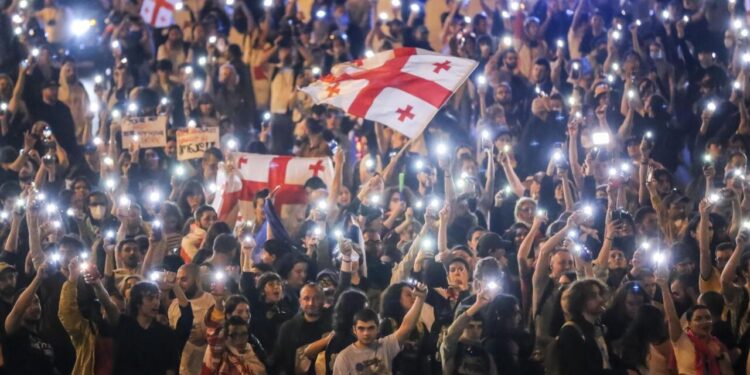Protests across Georgia have intensified as Prime Minister Irakli Garibashvili stands firm in the face of mounting international criticism, including strong condemnation from the United States. Demonstrators are voicing widespread discontent over recent government actions, accusing the administration of undermining democratic principles and civil liberties. Despite urgent calls from Washington to de-escalate tensions and engage in dialogue, the Georgian leadership remains defiant, raising concerns about the country’s political stability and its relations with Western allies.
Protests Escalate Across Georgia Amid Rising Political Tensions
Thousands of demonstrators have taken to the streets in multiple cities across Georgia, demanding government accountability amid escalating political unrest. The protests, initially sparked by allegations of corruption, have gained momentum following the Prime Minister’s recent refusal to heed calls from the United States to reconsider his stance on critical governance issues. Police reports indicate that the gatherings have been largely peaceful, yet tensions remain high as opposition leaders vow to intensify their campaign.
The current crisis is marked by distinct flashpoints that have polarized public opinion:
- Disputes over electoral reforms and judiciary independence
- Economic challenges exacerbating public dissatisfaction
- International diplomatic pressure clashing with national sovereignty claims
| City | Protest Size (Approx.) | Police Response Level |
|---|---|---|
| Tbilisi | 15,000 | Moderate |
| Batumi | 5,000 | Low |
| Kutaisi | 3,500 | High |
Prime Minister’s Defiance of US Criticism Triggers International Concern
The recent defiance of Georgia’s Prime Minister towards harsh criticism from the United States has ignited waves of unrest across the nation. Demonstrators, galvanized by growing dissatisfaction with the government’s response to international pressure, have taken to the streets in major cities including Tbilisi, Batumi, and Kutaisi. While the PM maintains a firm stance rejecting external interference, opposition groups and civil society leaders argue that this posture risks isolating Georgia on the global stage and jeopardizing crucial alliances.
Key points highlighted by observers regarding the escalating situation include:
- Government resilience: The PM appears determined to pursue an independent foreign policy, prioritizing national sovereignty over diplomatic appeasement.
- International ramifications: NATO members have expressed concern that Georgia’s defiance could slow integration efforts and diminish support.
- Public sentiment: Polls indicate increasing public frustration, with many citizens demanding dialogue that balances sovereignty with global cooperation.
- Economic impact: Market uncertainties have slightly increased amid fears of strained relations affecting foreign investment.
| Aspect | Current Status | Possible Outcome |
|---|---|---|
| Diplomatic Ties | Strained with US & some allies | Prolonged tension or negotiation |
| Domestic Protests | Growing in size and intensity | Potential government concessions |
| Economic Stability | Moderately impacted | Dependent on resolution pace |
Experts Urge Dialogue and Mediation to Ease Deepening Crisis
Amid escalating tensions in Georgia, leading political analysts and international conflict resolution experts have stressed the urgent need for constructive dialogue between the government and opposition forces. They argue that without open channels of communication, the growing unrest risks tipping into prolonged instability. Key recommendations include establishing neutral mediation bodies and leveraging international facilitators to build trust on both sides.
- Immediate ceasefire agreements to prevent further clashes
- Inclusive roundtable talks involving diverse political stakeholders
- Use of third-party mediators to ensure impartiality
- Development of clear timelines and accountability frameworks
Experts caution that failure to engage in meaningful mediation could exacerbate social divisions and hinder Georgia’s democratic progress. They highlight past successful conflict resolution models from neighboring regions, emphasizing that patience and sustained negotiation are critical for sustainable peace. Without this, the country may face deepening polarization and economic consequences.
| Mediation Aspect | Purpose | Expected Outcome |
|---|---|---|
| Neutral Facilitators | Ensure unbiased negotiation | Increased trust between parties |
| Ceasefire Agreements | Halting violent confrontations | Reduction in casualties |
| Inclusive Dialogue | Represent all political voices | Greater legitimacy of decisions |
| Timelines & Monitoring | Track progress transparently | Accountability and sustained peace |
Future Outlook
As protests across Georgia continue to escalate, the political landscape remains deeply unsettled. Despite mounting international pressure, including clear condemnation from the United States, Prime Minister Giorgi Gakharia has stood firm, refusing to alter his course. The unfolding situation highlights the growing tensions between domestic demands for accountability and external diplomatic influence. Observers will be closely watching how the government balances these competing pressures in the days ahead.
















